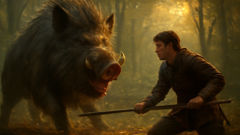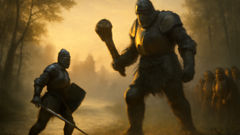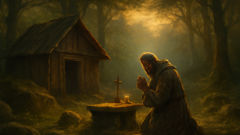Introduction
In the shadowed green heart of medieval England, stories drifted on the wind as thick as the morning mist, but none held the power to stir hearts and kindle dreams like the legend of Guy of Warwick. Born to humble stock in the rolling Warwickshire countryside, Guy’s fate was destined to entwine with both the glory and the sorrow of his time. To the north, the great castle of Warwick towered over the meadows, its banners unfurling with the promise of chivalry and the burden of legacy. It was here that Guy first glimpsed Felice, the Countess’s daughter—her beauty and learning as renowned as the stonework of the castle itself. Yet for Guy, this vision became an all-consuming beacon, leading him on a journey that would test every fiber of his courage, devotion, and humility.
The world in which Guy lived was one of restless knights and unending quests, where the clatter of hooves echoed through woodland glades, and the clash of steel rang out beneath storm-darkened skies. It was a world hungry for heroes, where a man’s worth was measured not by birth but by the deeds he dared to accomplish. Yet beneath the armor and the proud crests, hearts beat with longing, regret, and the quiet hope for forgiveness. Guy’s story begins in the warmth of youthful hope, but it winds its way through the shadowed forests of remorse, touching upon the eternal themes of love’s demands and the cost of true redemption.
Every traveler along the twisting roads of England heard of Guy’s exploits: how he overcame fierce dragons and vanquished monstrous giants, fought for king and country, and braved the dangers of faraway lands. But the truest test lay not in arms, but in spirit. For all his victories, Guy was haunted by the violence and pride that rose with every challenge. It was love that spurred him to greatness, and love, too, that cast him into solitude. In the end, it was not the roar of crowds or the shine of a sword, but the quiet grace of humility that crowned him as legend. In the story that follows, journey with Guy from bustling halls and bloodied fields to the peace of hidden woods and a hermit’s prayer—witness a life lived in pursuit of both triumph and forgiveness.
The Making of a Hero
Guy was born into a world where every sunrise was uncertain. His father, Siward, was a respected steward in the service of the Earl of Warwick, ensuring the castle’s stores brimmed with grain and that its hearths never went cold in winter. Young Guy’s earliest memories were shaped by the clangor of blacksmiths, the laughter of kitchen maids, and the distant calls of watchmen along the battlements. Though his birth was modest, his spirit was restless—a river that would not be contained by narrow banks.

From the moment he could walk, Guy sought out the company of knights. He’d sneak away from chores to watch sword drills in the practice yard, his eyes wide with wonder as seasoned warriors locked blades in dazzling displays of skill. The men humored him, letting him fetch water or polish shields, but Guy’s questions came as swiftly as arrows. He wanted to know the secrets of their craft, the code that governed their lives, and the stories behind every scar. In time, even the gruffest captains could not resist his eager enthusiasm, and Guy became a fixture in the castle’s bustling life.
Yet it was not until he met Felice, the daughter of the Earl, that his destiny truly took root. Felice was no mere noblewoman—she was learned, fluent in Latin and Greek, with a wit as sharp as any knight’s blade. Guy first saw her on a rain-soaked afternoon, her cloak drawn tight against the wind as she read beneath a yew tree in the garden. He’d never seen such grace, nor felt his heart tumble so recklessly. From that day, love became his guiding star.
But Felice was not easily won. She set conditions for her hand—Guy must prove himself worthy through deeds of valor. Her father approved, for he believed true nobility was forged in the fires of courage and service. The challenge was laid before Guy: to rise above his birth, to defend the weak, and to show that love, when coupled with honor, could move mountains.
Thus began Guy’s apprenticeship. He learned to ride and to wield lance and sword, to hunt and to read both words and men. His days were long and bruising, filled with drills in armor that chafed his skin raw and lessons in manners that tested his patience. Still, he persevered, for every step brought him closer to Felice and the life he longed for.
The first test came sooner than anyone expected. A wild boar, grown massive and cunning, began terrorizing nearby villages. Fields lay trampled, flocks were scattered, and children went missing. Guy begged leave to join the hunting party, but the knights scoffed at his youth. It was only after he slipped away in secret, tracking the beast through bramble and mire, that he proved his courage. The battle was savage—tusks met blade, blood soaked earth—but Guy returned at dusk with the beast’s head lashed to his spear and a gash on his arm that would scar him for life.
Felice greeted him with awe and concern. She bound his wounds herself, her gentle hands sending a thrill through him that no victory could match. The Earl, too, was impressed, granting Guy the right to join the ranks of his squires. It was a small step, but one that set Guy on a path no one could have foreseen.
As months passed, Guy distinguished himself in tournaments and border skirmishes. He defended travelers from highwaymen, wrestled a rogue bear that threatened a village, and once, at great risk to his own life, saved a child from drowning in the river Avon. Each deed won him renown, but also brought a growing weight—the knowledge that with every triumph, expectations mounted. Felice watched him closely, her approval a balm to his heart, but she never let him rest on his laurels. "True greatness lies not in a single act," she told him, "but in the constancy of the soul."
Guy pondered her words as he prepared for the greatest challenge yet—a summons to King Athelstan’s court. There, he would be tested not only by England’s finest but also by foreign champions who had come to prove their might. It was a crucible that would forge him into the legend he was destined to become.
Feats of Valor and the Price of Glory
At King Athelstan’s court, Guy found himself among warriors whose reputations spanned kingdoms. The hall thrummed with tension as knights from Normandy, Brittany, and distant lands gathered to compete for the king’s favor. Ornate banners hung from stone pillars; minstrels played songs of conquest and loss. For Guy, the spectacle was dizzying—he’d risen far from his father’s modest hearth, yet the true test of his worth had only just begun.

The king announced a grand tournament: contests of jousting, swordplay, and archery would decide who deserved the title of England’s champion. The prize was not only renown, but also the king’s ring and a favor from the noble ladies—Felice herself would present the victor’s wreath.
Guy entered the lists with a heart divided between fear and hope. His first opponent was Sir Durand, a knight known for his brute strength and unyielding temper. The clash was brutal; lances shattered, shields splintered, and horses reared in panic. Guy fought with cunning, using speed and agility where his foe relied on power. He was struck hard, his vision blurred by sweat and pain, but in a surge of resolve he unseated Sir Durand to thunderous applause.
The contests continued over three days—each bout more grueling than the last. Guy faced archers who could split a shaft at fifty paces, swordsmen whose skill bordered on the legendary, and horsemen whose control was near supernatural. With every victory, whispers grew in the crowd: could this young squire truly be England’s greatest hope? Felice watched with pride and worry, her eyes never leaving him.
The final day brought a challenge no one expected. News arrived that a fearsome giant, Colbrand by name, had landed on English shores, threatening to lay waste to the kingdom unless a champion faced him in single combat. The court shuddered; stories of Colbrand’s strength were the stuff of nightmares. Some knights withdrew, others made excuses, but Guy stepped forward. "For England and for love," he declared, "I will face whatever darkness threatens our land."
The duel was set at dawn on the banks of the Thames. Colbrand stood twice the height of any man, his armor a patchwork of stolen steel, his club the size of an oaken trunk. Guy donned his best mail, but beneath it wore Felice’s favor—a silken ribbon she’d pressed into his palm the night before, her words lingering in his mind: "Remember, your greatest strength is your heart."
The battle was savage. Colbrand’s blows split the earth and shattered shields; Guy darted and dodged, striking at the giant’s exposed legs and arms. He was thrown once, twice—each time rising with grim determination. The clash lasted until the sun stood high and sweat stung Guy’s eyes. Finally, finding an opening, he drove his sword beneath Colbrand’s arm, felling the giant with a cry that echoed for miles.
England rejoiced. King Athelstan embraced Guy as a son; Felice ran to him, tears shining on her cheeks. The people hailed him as their champion, and tales of his victory spread as far as Rome. Yet even as he basked in glory, Guy felt a strange unease—a nagging doubt that every triumph demanded a price.
In the weeks that followed, Guy was called to more quests: slaying a dragon that terrorized Northumberland, rescuing pilgrims from bandits on the road to Canterbury, defending Warwickshire from Viking raiders. Each victory brought more fame, but also more violence. Guy’s sword grew heavier with every life it claimed, and sleep came only in restless fits.
He confided in Felice one evening beneath the castle’s old yew. "Is this what it means to be a hero? To fight and conquer, while something inside you withers away?"
Felice took his hand, her gaze unwavering. "You’ve saved many lives, Guy. But the world’s hunger for heroes is never sated. True greatness lies not in the battles won, but in the peace you can bring to your own heart."
Her words haunted him. Even as Guy prepared to claim Felice’s hand and the title of Earl, he sensed that his journey was far from over. The price of glory, he realized, was the burden of regret—and it was a debt he would one day have to pay.
Remorse, Redemption, and the Hermit’s Path
For a brief time, Warwick knew peace and celebration. Guy and Felice were wed in a ceremony whose joy touched every soul from peasant to prince. Banners fluttered in the summer breeze; bells pealed from the castle’s highest towers. Their union was the culmination of years of striving, their happiness a balm after so much turmoil. Yet beneath the laughter and feasting, a shadow lingered in Guy’s heart—a heaviness he could not banish.

His dreams became troubled, haunted by the faces of foes vanquished and the cries of those lost in war. Even Felice’s warmth could not ease his restless spirit. He wandered the castle at night, gazing from high windows across moonlit fields, questioning whether all his feats had truly served a higher purpose—or merely fed his pride.
One evening, as autumn’s chill crept through stone corridors, Guy confessed his torment to Felice. "I have won glory and love, but I cannot find peace within myself. My hands are stained by violence, and my soul aches for something I cannot name."
Felice, ever wise, held him close. "You have given your all for England and for me. But perhaps it is time to seek forgiveness—not from others, but from yourself. True redemption is not found in conquest, but in humility and service."
Her words struck deep. The following morning, Guy rose before dawn, dressed in plain garments, and left a letter on Felice’s pillow. In it, he wrote: "I must leave behind the sword and seek forgiveness for the life I have led. I go not in despair, but in hope that I may find peace and return to you, heart made whole."
He slipped away into the woods beyond Warwick, leaving behind titles, riches, and fame. The world he entered was one of solitude and silence—ancient trees arching overhead, birdsong echoing in dappled glades. Guy wandered for days before finding a remote hermitage near the river Avon, tended by a kindly friar who offered food and counsel. There, Guy began a new life: simple, laborious, yet strangely liberating.
He spent his days tending a humble garden, caring for the sick and hungry who came seeking aid. He learned to find joy in small acts—mending a leaky roof for an old widow, sharing bread with hungry children, nursing injured animals back to health. The violence of his past faded beneath calloused hands and gentle prayers.
Yet Guy did not forget Felice. Every night he knelt beside his rough-hewn bed and prayed for her happiness and safety. Sometimes she appeared in his dreams, smiling with forgiveness and love. He longed to see her again but remained steadfast in his penance.
Years passed in quiet obscurity. Guy’s fame faded into legend—stories told by firesides and sung by minstrels who never knew the truth of his fate. Warwick flourished under Felice’s wise stewardship; she never remarried, holding hope in her heart that her beloved would return.
Then one winter’s eve, news reached Guy that Warwick was beset by famine and illness. The fields had frozen, and disease crept through the town. Though he was now stooped and grizzled with age, Guy resolved to return—not as a hero, but as a humble servant.
He arrived unrecognized at the castle gates. The guards saw only a weary hermit with kind eyes and a gentle voice. He tended the sick in makeshift infirmaries, shared what little food he had, and offered prayers for the suffering. Word spread of the mysterious stranger whose touch brought comfort to the dying.
Felice herself, now silver-haired but still radiant, came to see this man. Their eyes met across the candlelit hall, and in that instant she knew him. Tears flowed freely as they embraced—no longer lord and lady, but two souls reunited after a lifetime of longing and forgiveness.
Guy’s final days were spent in peace, surrounded by those he had served and loved. When he died, Felice buried him in the quiet woods he had cherished, planting a yew tree to mark his grave. The people of Warwick remembered him not only as a champion and lover, but as a man who had found redemption in humility and compassion. His legend lived on—proof that even the greatest heroes are shaped not just by valor, but by the grace to seek forgiveness and begin anew.
Conclusion
The legend of Guy of Warwick endures not simply because of his extraordinary feats or victories on battlefield and tourney ground, but because of his deeply human journey from ambition to humility. In Guy, we find the restless yearning for greatness that lives in every heart—the desire to rise above circumstance, to prove ourselves worthy of love and legacy. Yet it is his struggle with remorse, his willingness to forsake glory for inner peace, that transforms his tale from mere adventure into timeless wisdom. Through his exile and return, Guy shows us that redemption is always possible—that forgiveness begins when we have the courage to face our own flaws with honesty and compassion. In a world still searching for heroes, perhaps Guy’s greatest lesson is that true nobility lies not in conquest or acclaim, but in the quiet strength to serve others, ask forgiveness, and begin again. His story echoes down the ages—a reminder that the greatest legends are written not only in deeds of arms, but in acts of grace and humanity.













